Opinion
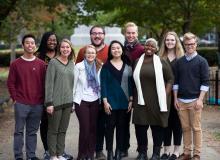
Living in the intentional community feels like living with nine incredible siblings. Holding faith, justice, and empathy as a foundation, we actively choose to get to know each other and allow ourselves to be known.
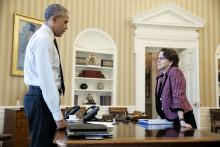
Cecilia Muñoz is one of the foremost experts on immigration in America today. In 2008, President-elect Barack Obama appointed her to his White House staff as the Director of Intergovernmental Affairs and later was appointed as Director of the Domestic Policy Council. The interview has been edited for length and clarity.

Why split public and societal critique from personal care and comfort? Whose ends does this split serve?

In his Neighborhood of Make-Believe, with simple hand puppets with complex internal lives such as Daniel Striped Tiger, Prince Tuesday, and Ana Platypus, he did something profound. Rogers and his collaborators on the show listened intently to children, created routine and a safe, sometimes magical place where they might be understood, affirmed, and cherished.
For those of us who perhaps didn’t always get the emotional support we needed at home, it was a gift that helped shape who we are as adults, parents, and grandparents.
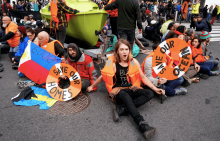
Being baptized at the Trafalgar Square protest site was not a publicity stunt for me. I had been Christened as a child, but still, receiving adult baptism was a choice I didn’t make lightly. I reaffirmed my baptismal vows at Extinction Rebellion because I needed God right beside me.
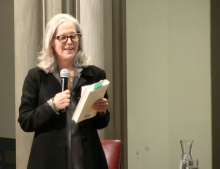
Dr. Serene Jones serves currently as president of the historic Union Theological Seminary in the City of New York — the first woman president in the institution’s 183 years of existence. Among her many illustrious achievements, Jones also served as president for the American Academy of Religion, the world’s largest association of scholars in the field of religious studies. Jones grew up in Oklahoma with her family, which she describes as “progressive and deeply Christian.”
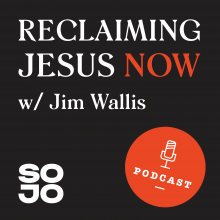
Jim Wallis, in conversation with William Matthews and Allison Trowbridge, explores the themes of Chapter Nine, “The Discipleship Question” from his new book Christ in Crisis: Why We Need to Reclaim Jesus.
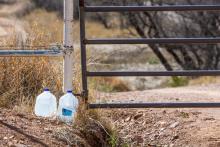
What does discipleship look like?
I was in Tuscon, Ariz., this week for the final day of the trial of Scott Warren, a volunteer who helps migrants in the desert. He was charged with a felony for “harboring” and assisting “illegal aliens” with a potential sentence of 10 years in prison. I gave a statement outside the Tucson courthouse and then joined a group of clergy flooding the courtroom as the closing arguments were presented and the jury was sent out to make their decision.
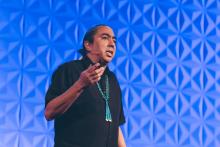
Mark Charles describes himself as a dual citizen of the United States and the Navajo Nation. He is making history this year by becoming the second-ever Native American to run for president of the United States of America. I recently heard Mark speaking at the Aspen Institute about how white supremacy infiltrated Christian theology to justify colonialism, oppression, and genocidal violence. I also read his recent book on this topic co-authored with Soong-Chan Rah titled Unsettling Truths: The Ongoing Dehumanizing Legacy of the Doctrine of Discovery.

Sustainable fashion is a rapidly growing movement. Honoring the labor, expertise, and material resources used to make clothes is also an essential way for people of faith to honor God. So how do we do that effectively? Thankfully, the solution starts no further than your closet. Here are five ways to dive in and begin embodying Christ’s righteousness in your relationship to your clothes.
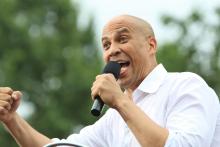
In the second season of The Soul of the Nation, Jim Wallis is sitting down with some of the presidential candidates to discuss how their faith informs their work. Following is a transcript of Wallis’ interview with Sen. Cory Booker, discussing Booker’s faith, the role of faith in the public square, his favorite hymn, and more.
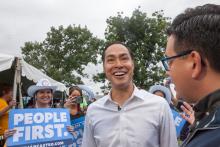
In the second season of The Soul of the Nation, Jim Wallis is sitting down with some of the presidential candidates to discuss how their faith informs their work. Following is a transcript of Wallis’ interview with Julián Castro, discussing Castro’s Catholic faith and upbringing, why Democrats should talk more about religion, and more.

Motherless Brooklyn, writer-director-star Edward Norton’s adaptation of Jonathan Lethem’s 1999 novel, is confident enough in its own scope to begin with Shakespeare, and it certainly backs up this confidence with an argument. A quotation from Measure for Measure invites us to reflect on the nature of power: “O! It is excellent to have a giant’s strength, but it is tyrannous to use it like a giant.”
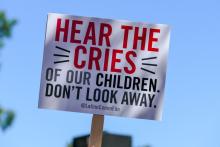
The United States, in particular, is abandoning our founding principles and those that have sustained our position as the aspirational bastion of freedom and opportunity. Our failure is reprehensible: Even as we fail to protect children, we are daily compounding their trauma and harm through policies detention and separation. History will remember the cruelty of this administration, the atrophy of moral leadership, and the apathy of the American people.
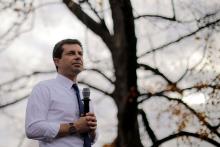
In the second season of The Soul of the Nation, Jim Wallis is sitting down with some of the presidential candidates to discuss how their faith informs their work. Following is a transcript of Wallis’ interview with South Bend, Ind., Mayor Pete Buttigieg, discussing Jesus, his personal faith, abortion, religious freedom debates, and more.
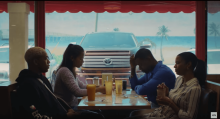
Every moment feels true to life, and the literal waves — the peaks of emotion and the sinking tragedies — carry viewers up and down, a rhythm as unpredictable as it as captivating. WAVES is a film for 2019, that does not shy away from the music and actions of teenagers living in 2019.

When we’ve decided to call ourselves woke, we are disregarding the journey of becoming woke along the way. When we say we are already decolonized, we are neglecting the seriousness of the journey toward decolonizing in all its complexities.
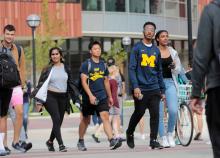
Higher education student loan debt has become a hot topic in the current political debate, with several presidential candidates calling for either full or partial student loan forgiveness. And as student loan debt levels reach historic highs, it is clear this is a problem worth solving. One only needs to look back to the Great Recession to see how widespread out-of-control debt can shock the entire U.S. economy. The student loan debt crisis does not exist within a vacuum, however, and can be compounded by several issues that also need addressing.

Jim Wallis, in conversation with William Matthews and Allison Trowbridge, explores the themes of Chapter Eight, “The Peacemaker Question” from his new book Christ in Crisis: Why We Need to Reclaim Jesus.
book.sojo.net
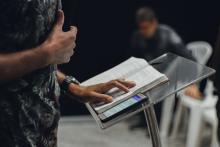
Andy Savage’s website includes several blog posts about how to be a good parent and husband, but Jules Woodson says that he sexually assaulted her while she was a minor and he was her youth pastor at a Southern Baptist Church (SBC) in Texas.